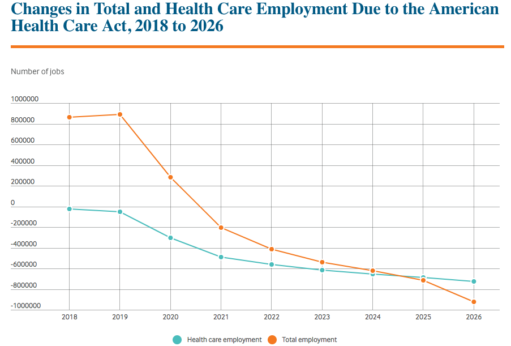
An independent study for the non-profit Commonwealth Fund calculates the Senate Republicans’ “replacement” for the seven-year-old Affordable Care Act could cost 919,000 jobs in health care alone by 2026 – and 1.45 million jobs overall by that time.
Health care jobs would start to shrink immediately: -30,000 in 2018 and -111,000 the year after that. They pace would accelerate to a 347,000-job loss in 2020, with rising counts afterwards.
One-third of the health care job loss next year would be in Michigan alone (-10,100), the study, by five public health specialists at George Washington University, calculates.
The study concedes that if the Senate GOP’s health care bill becomes law, even sectors tied to health care would start shedding jobs after an initial two-year increase. Those fields start declining in 2020, from -13,000 that year to -350,000 in 2021, with expanding declines beyond that.
Michigan would also be the sole state to lose jobs overall next year (-2,200) because the GOP-run legislature expanded Medicaid coverage there but on the condition that if Congress repealed that expansion, the state would drop it, too.
The study adds to the weight of evidence against the Republicans’ replacement bill, pushed by Senate Majority Leader Mitch McConnell, R-Ky. The measure is in political trouble due to GOP defections – most of them caused by the fact that it would throw 22 million people off of health insurance in a decade, with two-thirds of them losing it next year.
The analysts report job losses in 2026 would be in health care, the retail trade (-101,000), construction and real estate (-91,000), government (-46,000), finance and insurance (-16,000), and other private industry combined (-281,000). It did not break down the health care jobs within that sector.

Unions and their allies have emphasized loss of health insurance coverage in their campaigns against repealing the ACA and replacing it with the GOP measure, called the “Better Care Reconciliation Act,” or BCRA. But they also are aware of the job losses among workers.
Sheila Lindsay of the American Nurses Association, whose staff is unionized, says her group is planning to ramp up its campaign among its members.
National Nurses United (NNU) Communications Director Charles Idelson says NNU “is more concerned about the impact on patients, why the Dems are so reluctant to admit the weaknesses of the ACA that led to this, and why they don’t do more to promote the real fix – single-payer,” referring to government-run Medicare for All, a top NNU cause.
At least one Senate Democrat, Oregon’s Jeff Merkley, reported July 11 that even Republicans are telling him at home that they back single-payer. And Sen. Bernie Sanders, Ind.-Vt., has pushed it for years.
The Commonwealth Fund study also reported states would lose $162 billion gross (state) domestic product value in 2026 if the GOP legislation passed, and $265 billion in business output. In both areas, the states are projected to gain money by absolute volume – though in declining numbers – from 2018-20, but then begin running in the red starting in 2021.
Besides the immediate Michigan health care and overall job losses, the health policy analysts who constructed the study calculated the largest state health care job losses in 2026 would be in California (-93,500 jobs), New York (-81,300), Pennsylvania (-62,800 jobs), Ohio (-52,300), and Michigan (-44,900). No state would gain health care jobs, while only six – Alaska, Hawaii, the two Dakotas, and Wyoming – would lose 2,500 or fewer that year.
And that’s just in the first decade if Congress approves the Senate GOP’s health care bill and President Trump signs it. The second decade could be worse, the analysts warn.
“Coverage and spending-related policies are directly related to funding for health services e.g., Medicaid, premium tax credits, and high-risk pools,” wrote the study’s five co-authors, all with masters’ degrees in health policy and employed by the health policy research center at George Washington University in D.C.
“The reductions directly affect the health sector – hospitals, doctors’ offices, or pharmacies – but then flow out to other sectors. Thus, almost half of jobs lost due to coverage policies are in the health sector while the rest are in other sectors,” they explained.
And things will only get worse after 2026, the Commonwealth Fund study adds. It notes that the GOP is considering its replacement for the ACA at a time of low inflation and low unemployment – in other words, at the peak of a business cycle. And the way the GOP bill is structured, the study warns, would only worsen a subsequent slide.
“It is likely the business cycle will eventually slow down again in the future. In that event, the BCRA” – the Senate GOP health care bill – “could accentuate job loss and economic contraction. Combined with major increases in the number of uninsured, this could contribute to a period of economic and medical hardship in the U.S.
“The BCRA could distort both the highs and lows of the business cycle. From a national policy perspective, it may be more useful to develop countercyclical policies that strengthen employment and the economy during times of contraction.
“The combination of more uninsured and more unemployed people will increase the demand for social assistance, but weaker state economies and federal reductions in Medicaid spending will make it more difficult for states to respond to those needs. States will confront painful choices between raising taxes or slashing services,” it predicts.










